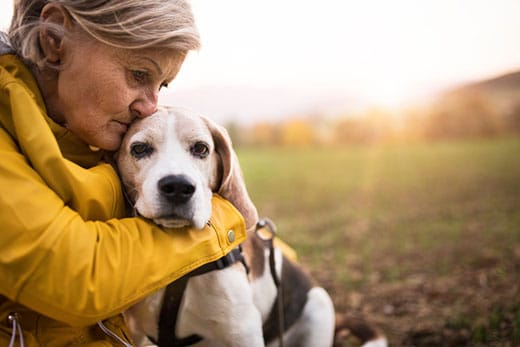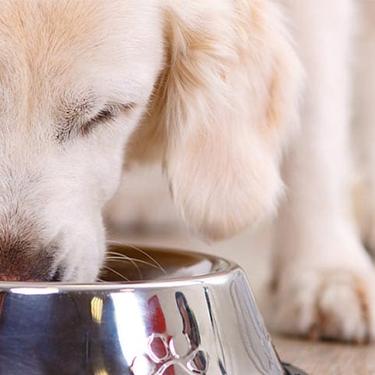
-
Find the right food for your pet
Take this quiz to see which food may be the best for your furry friend.
Find the right food for your pet
Take this quiz to see which food may be the best for your furry friend.
Featured products
 Small & Mini Savory Stew with Chicken & Vegetables Dog Food
Small & Mini Savory Stew with Chicken & Vegetables Dog FoodA delicious complement to the nutrition of Science Diet Small & Mini 7+ dog food
Shop Now Adult 7+ Perfect Digestion Chicken, Whole Oats & Brown Rice Recipe Dog Food
Adult 7+ Perfect Digestion Chicken, Whole Oats & Brown Rice Recipe Dog FoodScience Diet's breakthrough nutrition supports ultimate digestive well-being & healthy microbiome for dogs age 7+
Shop Now Adult Healthy Cuisine Roasted Chicken, Carrots & Spinach Stew Dog Food
Adult Healthy Cuisine Roasted Chicken, Carrots & Spinach Stew Dog FoodDelicious roasted chicken paired with tender vegetables in a succulent stew
Shop NowFeatured products
 Adult 7+ Senior Vitality Chicken & Vegetable Stew Cat Food
Adult 7+ Senior Vitality Chicken & Vegetable Stew Cat FoodImproves Everyday Ability to Get Up & Go
Shop Now Adult 7+ Tender Tuna Dinner Cat Food
Adult 7+ Tender Tuna Dinner Cat FoodWith delicious chunks in a decadent gravy
Shop Now Adult Savory Entrée Can Variety Pack Cat Food
Adult Savory Entrée Can Variety Pack Cat FoodPrecisely balanced nutrition with the delicious taste of savory minced chicken to help fuel the energy needs of cats during the prime of their life
Shop Now -
Dog
- Dog Tips & Articles
-
Health Category
- Weight
- Food & Environmental Sensitivities
- Urinary
- Digestive
- Joint
- Kidney
-
Life Stage
- Puppy Nutrition
- Adult Nutrition
- Senior Nutrition
Cat
- Cat Tips & Articles
-
Health Category
- Weight
- Skin & Food Sensitivities
- Urinary
- Digestive
- Kidney
-
Life Stage
- Kitten Nutrition
- Adult Nutrition
Featured articles
 Do Dogs and Cats have Belly Buttons?
Do Dogs and Cats have Belly Buttons?Learn whether cats & dogs have belly buttons like humans, what the function is, and if there are any health concerns associated with it.
Read More Does My Pet Hate Me?
Does My Pet Hate Me?Learn tips for bonding with your pet if you've ever thought, 'My dog doesn't like me, or 'Why do I have a standoffish cat?'
Read More Why Are Dogs and Cats So Cute?
Why Are Dogs and Cats So Cute?If waggy puppy dog tails and furry kitten yawns make you swoon, you're not alone. Why are cats so cute? And, dogs too! Let's find out!
Read More -


Finding out your dog has cancer is possibly the worst news a pet parent can get. Depending on the type and severity of the cancer, you'll most likely start thinking about what this means as far as next steps. What can you do to help optimize your dog's quality of life in their final days? How do you know when to euthanize a dog with cancer?
Understand Your Treatment Options
Upon hearing the word "cancer," chemotherapy often comes to mind. There are many kinds of cancer in dogs, and chemotherapy is effective in some but not all. Other cancers (typically those ending in "sarcoma") respond well to radiation therapy. Some cancers require surgery, while others frustratingly evade every treatment option in the book. Get the facts from your veterinarian on your dog's specific type of cancer and the available treatment options.
While chemotherapy and radiation are two of the most common treatment options for cancer in dogs, according to VRC Oncology ,you might be reluctant to pursue them. While they can be costly and time-consuming, some cancers respond well to these therapies. Consider scheduling a consult with an oncologist to learn more about treatment options and to discuss your questions and concerns. During a consult, you're not committed to anything. Think of it more as a safe space where you can weigh the options so you can make a personal, informed choice about what's best for you and your dog.
Some cancers, such as certain lymphomas, respond to a corticosteroid medication called prednisone. A new vaccine is also available for oral melanomas in dogs that uses the dog's own immune system to fight the cancer. Oral chemotherapy options — yes, a pill! — are available as well. Know your options as there might be more than you think.

Know When It's Time to Say Goodbye
No matter which road you choose, the time will come when you'll need to decide when to say goodbye. But how do you know?
When It's an Emergency
Deciding when to euthanize a dog with cancer is clearer in some situations than in others, like emergencies. An example of a sudden emergency is a dog with a brain tumor who's having frequent recurring seizures. Another example could be if your dog has a tumor growing within their spleen that's bleeding into their abdomen (or belly). Emergency situations like this can be emotionally difficult because there's not as much time to prepare. The silver lining is that your decision is clear. In these situations, you don't have to think about when to euthanize a dog with cancer; you just have to act.
When Your Dog's Quality of Life Declines
But what about when the time to euthanize isn't as obvious? Maybe your dog has bone cancer and pain medication isn't helping, or maybe your dog has a liver tumor that's keeping them from eating enough to sustain their desire to play. You want more time with your furry friend, and it can be hard to know when to say goodbye. In these situations, euthanizing is a personal decision that depends on many factors, including your dog's quality of life. Several sites provide quality of life scales to help with this decision, such as The Ohio State University. You'll also want to watch for signs your dog is in pain.


Tasty Tips
Signs Your Dog Is in Pain
While crying or whimpering can indicate pain, many dogs who are in pain don't make a sound. When you're couch-bound with the flu, you likely lie there quietly rather than groaning the whole time. Dogs are the same way: They'll yelp with acute pain, like you would when stubbing a toe, but they're often silent when experiencing chronic pain.
According to the American Kennel Club, some of the more obvious signs of pain include restlessness, increased breathing rate and trembling, but here are some more subtle signs to watch for:
- Decreased appetite. Decreased appetite can indicate your dog is experiencing discomfort and losing their zeal for life. This isn't the case for all dogs, though — some dogs eat up until their final breath. It's not safe to assume that your dog isn't in pain just because they're eating.
- Lack of movement. Reluctance to move is a big one. Has your dog stopped greeting you at the door, waiting for you to come to them instead? Does their range of daily activity entail walking outside to go potty and then coming back in? This is a good indicator that your dog is in pain.
Sometimes these changes are so gradual that it's difficult to notice them. It can be helpful to look at old photos or videos of your dog as a reminder of how they used to act and to give you a basis for comparison. A friend or family member that doesn't see them every day can be helpful as well.
Optimize End-of-Life Nutrition
In addition to learning about treatment options and observing your dog for signs of pain and decreased enjoyment, you'll want to do all you can to keep them comfortable in their final stage of life. Living with and fighting cancer requires substantial nutrients & calories, so some dogs need to be fed extra to account for the tumor that's draining their nutrients. Many dogs will still lose weight (called cachexia) from cancer, but feeding them a high-calorie food can help slow down that process. Check with your vet to determine the best food for your dog.
As you consider when to euthanize a dog with cancer, remember this: There's no one right or wrong answer. Some people think if they don't pick the exact date, they've failed as a pet parent. If you care enough about your dog to read articles and do your best to inform yourself, your dog is in good hands. As you face saying goodbye to your best friend, remember the good times you had, and know that you'll do right by them to the very end. Your dog will love you for it.


Dr. Karen Louis owns her low stress veterinary clinic near St. Louis. When she's not helping dogs and cats live their best lives, she maintains her blog, VetChick.com, and is an award winning nature photographer.
Related products
Related articles

Learn the the dangers of feeding your dog chocolate, which types are most dangerous, and what to do if you discover that they have consumed chocolate.

Proper nutrition for your pregnant or nursing dog is vital to her and her puppy's health. Learn what you should do provide her with the proper nutrients.

Learn how today's wet dog food blends have gotten a face lift, and how you'll provide your dog the nutrition he needs in the form he loves.

Learn about choosing the right dog food to help ensure your adult dog will receive the correct balance of nutrition.

Put your dog on a diet without them knowing
Our low calorie formula helps you control your dog's weight. It's packed with high-quality protein for building lean muscles, and made with purposeful ingredients for a flavorful, nutritious meal. Clinically proven antioxidants, Vitamin C+E, help promote a healthy immune system.
Put your dog on a diet without them knowing
Our low calorie formula helps you control your dog's weight. It's packed with high-quality protein for building lean muscles, and made with purposeful ingredients for a flavorful, nutritious meal. Clinically proven antioxidants, Vitamin C+E, help promote a healthy immune system.

